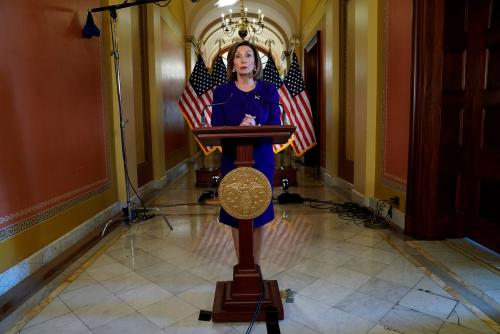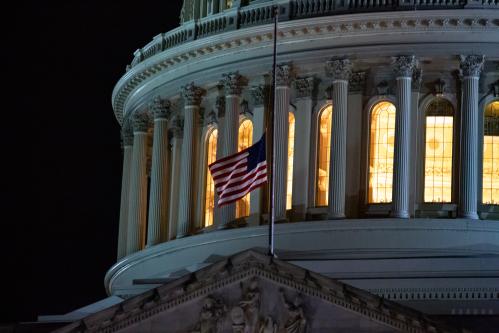During the Watergate investigation, President Richard Nixon’s supporters would often argue that because they agreed with his policy positions, they could overlook his ethical and moral shortcomings. At that time a member of the U.S. House, Earl Landgrebe from my home state of Indiana, took this position to the extreme when he said, “Don’t confuse me with the facts” because he had made up his mind and would continue to support the president.
We hear a similar sentiment expressed today by supporters of President Donald Trump as they support his continuing claims that the election was fraudulent. This reflects a belief by some that ethical leadership is not important, or even relevant, so long as elected officials advance policies with which they agree. This kind of thinking is a threat to our democracy and our country.
Democracy is a form of government built on a foundation of ethical principles and it cannot survive unless those principles are honored and protected. Values matter because how we adopt laws is as important as the laws we adopt, and all of us are charged with protecting the self-governing principles that are the foundation of our great nation. Unethical leadership can undermine the democratic process, and even democracy itself.
Values-based leadership is essential to preserving and protecting democratic principles and there are at least three widely recognized moral virtues that are central to ensuring the governing process is democratic: truthfulness, justice, and temperance.
Truthfulness
When leaders lie, it is usually because the facts are not on their side and they do not want others to know the truth. They think the lie benefits them personally, usually at a cost to the rest of us. According to The Washington Post, The Fact Checker determined in August of this year that President Trump had made 22,000 false and misleading claims since taking office.
These untruths hurt our democracy because when our leaders deceive us, it becomes more challenging for the public to learn the facts. And that makes it more challenging for citizens to provide meaningful input. This undermines the all-important role of the citizenry in the policy-making process and it will most likely lead to the adoption of policies that are flawed because decisions based on falsehoods are usually bad decisions.
I came of age when the nation was deeply divided over our involvement in the Vietnam War and I very much wanted to believe that our political leaders were telling us the truth and that the anti-war protesters were wrong. But by the time I had completed my freshman year of college, critical content of the Pentagon Papers had been leaked to the press, confirming the very criticism the protesters were raising. Had the citizenry been told the truth, the course of history could have been changed for the better.
And today, we have lost tens of thousands of lives to COVID-19 that could have been saved had President Trump stated to the public what he said in his interviews with Robert Woodward.
Justice
Justice exists only when there is fairness in the process of governing. It requires those in leadership positions to consider the varied interests of all and to protect equality of participation. There must also be transparency.
Voter suppression of any kind is unjust and a threat to democracy. For example, how we draw congressional district maps influences the fairness of our elections. When congressional districts are construed in ways that concentrate voters of one political party in a smaller number of districts than is representative of the actual number of voters in that party, it can result in one party receiving a larger share of seats than votes.
As an example, in 2016 Republican candidates running for the U.S. House received 49.9 percent of the votes cast, while Democratic candidates received 47.3 percent of the votes cast. But Republicans won 55.2 percent, and Democrats won 44.8 percent of the seats in the House. In other words, Republicans got a “seats bonus.” Such gerrymandering suppresses the voices of voters across the country and clearly undercuts the most basic democratic principle of political equality.
Temperance
Temperance is also central to democratic leadership. In democracy we do not each get our way, but we must respect the right we all have to work with our fellow citizens and address our challenges in a way that moves us forward as a people. Respect for the rights of others is essential. Good leaders do not divide and conquer, but rather, they bring people together through the democratic process. We are all in this together and we must all work together for the greater good of our nation.
Democracy is a principled form of government in which we all matter, and values-based leadership is central to preserving and protecting this great democratic experiment we call the United States of America.
Jill Long Thompson is a former Member of the U.S. House of Representatives, former Under Secretary at U.S.D.A., and former Board Chair and CEO at the Farm Credit Administration. She is a visiting scholar with the Ostrom Workshop at Indiana University Bloomington and has authored a book, The Character of American Democracy, published by Indiana University Press on September 15, 2020. The opinions expressed in this essay are hers and do not necessarily reflect those of Indiana University.






Commentary
The character of American democracy: Values-based leadership
November 12, 2020